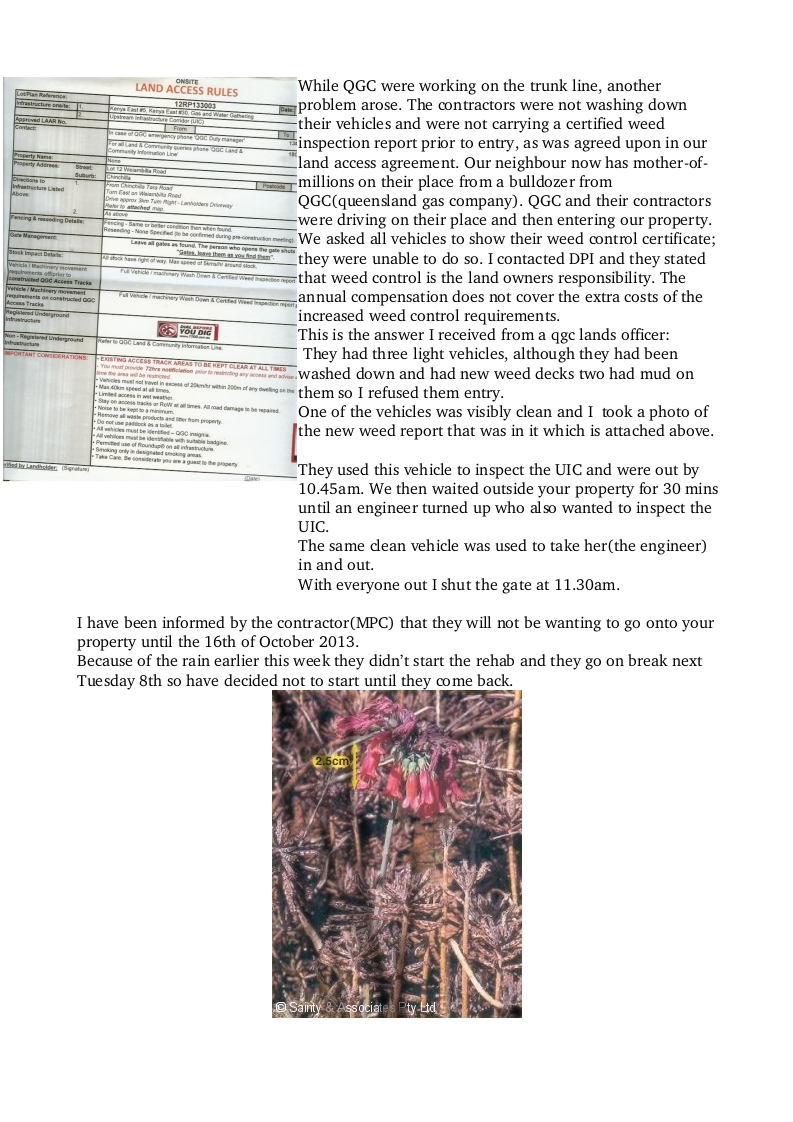Session 5 – Cultural and Social Impacts
The social costs case will address impacts on communities, social services, roads, housing, property values and relations among neighbours
View and download a PDF version of this PowerPoint presentation here. [1MB]
Cloudcatcher Media Testimony
Cloudcatcher Media have generously provided their production “Sacrifice Zone” as testimony. It contains expert evidence from numerous people covering every facet of the human rights impacts of unconventional gas, particularly in relation to the Narrabri Gas Project in NSW, Australia. Cloudcatcher Media are journalist and filmmakers. They have spent 1 year and 24 days making the insightful film and believe that the information contained in this film covers many aspects of the harms the CSG industry causes and demonstrates it is incompatible with any known human rights standards and this issue must be explored fully.
Link to the free full feature film
Testimony by Carly Woodstock
Testimony by Rev Graham Slaughter of the Uniting Church Leichhardt Patrol
Testimony by Jang Family
Click here to read the Jang Family testimony to the Tribunal.
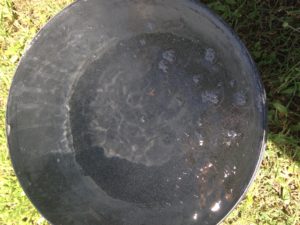
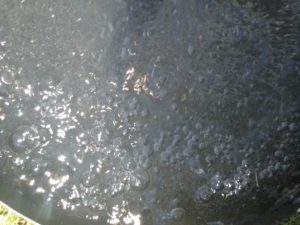
methane bubbling in water drawn directly from bore
Testimony by Kylie H – Western Downs
This is submitted by Kylie H as her family’s testimony to the Tribunal.
Click here to read KylieH’s Submission
John Jenkyn’s Testimony
My name is John Jenkyn and I have lived in the gasfield about 30 km outside of Chinchilla since 2005. I have been recording my experience of living in the gasfield on my facebook account for many years now, and I have made a selection of my posts here as evidence of the social impact this industry has had on my and my family’s life. I have also included some submissions I have made in order to further provide information on the impact this industry has had on our life.
Testimony from Brian Monk
My name is Brian Monk, I live in Kogan Queensland. I would like the following to be my testimony to the tribunal. My family made these videos in an effort to show the truth about this industry. I believe that they show the impact the industry has on human rights such as health, right to information and rights to participate through industrialising the rural community, destroying the future viability of a nation through pollution and water war games, the inequity and corruption between politics and the industry and the people impacted, the changes to legislation that advantage the industry and remove our right to participate in decision making.
Anonymous Testimony
News article relating to workplace issues for radiation, but nothing about the location also being a family home.
Mrs Veronica Laffy Testimony
My Name is Veronica Laffy, and I would like the following to be my testimony to the Tribunal. I think the following demonstrates the lengths we have gone to in order to try to have the Government understand the risks and the enormous impact this industry has on our lives, families and businesses.
Mrs Karen Auty Testimony
My Name is Karen Auty, I would like the following to be my testimony for the Tribunal.
The following is my submission I made to the Select Committee on Unconventional Gas Inquiry in 2016.
The elements it would add / update to this testimony include:
- Now going into the 5th year of a real estate crash with continuing high vacancy rate on rentals.
- The demographic changes to the community relating to the extremely low rentals in response to the crash is having a significant impact on the crime statistics, in particular drugs and domestic violence.
- The response to the rising incidents of crime has been wholly inadequate and cause for great consternation amongst the general population including the latest movements in the direction of vigilantism.
- Apart from the original amalgamation of councils in the area that appeared to pave the way for the industry, the Western Downs Regional council originally had a very sympathetic membership toward the industry, however in 2015 a new CEO was installed who was hand picked to further facilitate the industry and now we have the ripple effect where we have a corporatized council where the council are not even willing to meet with rate payers to discuss excessive rate rises, water issue and other concerns of the community. And it appears that actual elected councillors have been disempowered when it comes to policy and decisions.
- This situation seems to be repeated through each level of government to where it ultimately suggests the need for a federal ICAC. This points relates to the last section of my submission.
Clearly, there has been a lack of engagement, communication and information from government with regards to future impacts on families, communities, local economy and social fabric prior to industry commencement. There has been STILL been no benchmark, baseline testing of waterways, noise, vibration, light, atmosphere or drinking water tanks.
The responsibility of testing has been left to individuals.
The government has failed in its duty to maintain and monitor Public Health standards. I respectfully request that a full, proper and thorough investigation into all aspects of the Coal Seam Gas industry be instigated in the form of a Royal Commission Federal Independent Commission against Corruption.
Farmers lose $2 Million on average when CSG arrives
Miles: the Coal Seam Ghost Town
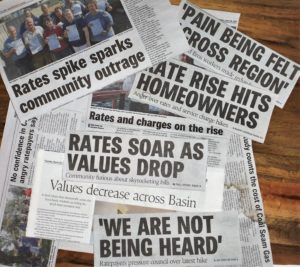
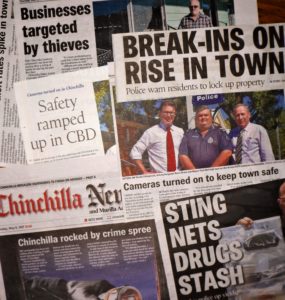
Ms Helen Banks Testimony
Let me say from the get-go that I am strongly against this destructive method of gas mining, and evidence from around the world shows conclusively that it is detrimental to the local environment, resulting in devastation in the short and long term.
My reasons include:
1. Inconvenience to and affect upon the local land-owners often leading to degradation of the quality of the land and destruction of their livelihood. Inconvenience is perhaps too light a word – many farmers find that they cannot farm their land at all once these wells are drilled and the miners move in.
2. Evidence in the US has shown that the methods used to obtain the gas have caused destruction of the very structure of the earth beneath, and earthquakes occur in areas with no history of such. There is a plethora of information from farmers in the US who have found their soil and pastures poisoned by the chemicals, and their land worthless as a result.
3. Again, experience in the US has shown that these mining companies go “bankrupt”, and the rehabilitation of the mining area, part of the permit contract, is not completed, and is left to the local or state governments to complete, if in fact it is done at all.
4. Degradation of the water supplies, first by depletion as a very large quantity of water is required for the fracking process, and secondly by gas leaking into rivers and creeks poisoning aquatic life and posing a danger to those who frequent the waterways for recreation.
5. Fire hazard. Australia is a land blighted by the ever-present threat of bush fires. Some of the areas being mined for gas are in or are close to valuable virgin bush and national parks. Fire caused by sparks from gas burn off endangers these areas which would suffer catastrophic damage to ecosystems and wildlife and to those living in close proximity.
6. Toxic chemicals are used in the fracking process. These are never going to go away. One way or another, either in the ground water, hydrostatic water movement or through springs, they are going to emerge into often pristine environments. Outback Australia has depended on ground water for its survival since it was settled. One way or another, this polution will find its way to town and city water supplies, or to our once-pristine oceans.
8. Alternatives. Why are we even considering this destructive form of gas mining when we have large natural gas reserves off Western Australia and the Northern Territory?
– Who is accepting financial kickbacks for these unpopular short-term decisions that will have devastating effects?
I hope you will bear these points in mind when deciding whether to support the wishes of the Australians who live in the areas involved, or to support the corporations who merely want to rip money out of the ground, who don’t live anywhere near the subject areas and who care little for the livelihoods of the locals or their future.
I can assure you that regardless of the decision made by the Tribunal, local people will not stand by and watch their land and livelihood destroyed by greed.
This is such an important issue that it should be decided by those living in the areas affected, not by those living in cities who have no idea, if they even care, about the realities of rural life and livelihoods.
Ms Jo Evans Testimony
Ms Marion Whitecross Testimony
We bought 39 acres in Tara 10 years ago. We where going to retire there, but along came the gas wells. So we put it on the market. But we can’t sell because of gas wells and now our block is only worth half what we bought it for. But Dalby shire haven’t dropped rates they’ve gone up??? I wonder how many people can’t afford them now and handed them in to the shire. I think the shires treating of their rate payers is disgusting.
Dr Hugh Barrett Testimony
Dr Hugh Barrett also took a visit to Queensland Gas Fields in 2014 and contributes his photos from that trip as further testimony. Click on a photo to see it larger and a description
Slideshow
Testimony from WA – Name Provided
I am a landowner living in Western Australia. The unconventional gas industry has hardly begun in WA but we are already feeling it’s impacts. I have heard stories from many people currently living with gaswells on their properties or in their communities in Qld and in the US and fully acknowledge that their experiences are orders of magnitude worse than ours, but I am writing to explain that the impacts begin long before drilling even starts.
We became aware in 2016 that a gas lease over our land, along with that of thousands of other Western Australians had been sold to a gas company. We were not consulted or even informed at any stage by the government. We live in a small acreage residential area where block sizes are typically 5 acres. We understand that at any time we could be notified that the lease holder plans to drill on our land and that we have no rights to refuse them entry.
A shale well pad is typically the size of our entire block -approximately 5 acres/2 ha. Our state government regulations do not specify a minimum land size on which gas companies can operate, nor do they specify a minimum setback from homes, other than if they want to drill closer than 150m from “significant improvements” they have to get permission from the Minister for Mining and Petroleum. The landowner has no say. What that translates to in our area, is that every well pad would take a large percentage of the land owned by 2-4 households, meaning that we could not conduct our current activities on our own land. It would mean that at least 4 households would be living less than 100m from every well and about 8 living within 250m of every well. It means that EVERY household would be within 400m of several wells. We are well aware of the measurable health effects on populations up to several miles from gas wells, and that the health effects are dose dependant – ie the closer you are and the more wells in your area, the greater the health effects.
We have no right to refuse this and have to take the company to court to be compensated for any “damage” they cause. This is at our expense and can be expected to take years.
As I have said, this has not yet occurred in most of WA, and in any given area may never happen. But if it does happen, we will be unlikely to be informed until it is to late to sell up and move. Once an area is known to be targetted for a gas field, a lot of people want to get out, but no-one is willing to buy.
This leaves us with a difficult and costly decision. Do we sell now, before any activity is likely any time soon, an action which will leave us out of pocket by about $60 000 just on fees, stamp duty and moving costs, even if we do not lose value on the house, in addition to the time, energy, stress and disruption involved in a house move that we don’t want. Or do we wait and see, living with the stress, uncertainty and risk that should a gas field be developed in our immediate area, by the time we would hear that it was occurring, we would be stuck, unable to sell our house and unable to afford to move elsewhere. As someone who suffers from respiratory illness that is triggered by reductions in air quality and particularly by diesel, VOCs, petrochemicals and dust, and whose illness is exacerbated by stress, we feel we cannot stay in our own home due to the possibility of gas field development in our area. We feel that we cannot risk being trapped in an area that I am unable to live in and as our house is our only major asset, we feel that we cannot risk it becoming a higly devalued or unsaleable asset. We can’t really afford to lose $60,000 either. That will come out of our super, and due to my illness which has resticted my ability to work in recent years, we already do not have enough for our retirement. Even moving to a new home, not currently under a gas lease does not offer security. Our home was not under a gas lease when we bought it, and our state government continues to sell gas leases, including in regions that are covered by a fracking ban. We could go to all the trouble and expense of moving, only to be faced with the same losses again and we have no way to avoid this.
We have experienced harm from the sale of a gas lease on our land. We will sustain significant financial loss. We are suffering stress and uncertainty resulting in diminished quality of life. We will incur considerable disruption and inconvenience, loss of our home and community because we feel that we cannot stay. We may find that our new home, when we find one, is also sold out from under us to a gas company and there is nothing we can do to prevent this from happening. We feel completely disempowered by having this forced upon us and having no control and no rights. We are angry that the rights and well being of the landowners are being ignored by Australian state and federal governments for developments that we see as benefitting no-one but a small number of foreign owned energy companies.
Our rights to the secure ownership of our property, our right to the security of our home, our right to health, all of these are already impacted by the gas industry, even if no drilling ever occurs in our community.
Sharon Lohse Testimony
Summary of a landholder’s attempt to get government and industry support to address the devastation of Cultural Heritage and to manage contamination of creek.
Hayley Katzen Testimony
In 2013 after a company first applied for a licence to explore for gas in the rural area in which I live with my farmer partner, we went to Queensland to see for ourselves. It was there I first understood how the unconventional gas industry was infringing human rights.
After this trip, I wrote an essay which was first titled ‘From Apathy to Ardour’. It was subsequently published online and retitled ‘Fracking up a storm’ …here is the link
Mark Doyle Testimony
The following was filmed by Mark Doyle and shown here with his permission as evidence and testimony, it shows the personal cost of this industry on families and individuals.
Mrs Pam Bender Testimony
My name is Pam Bender. I would like the following to be my testimony to the Tribunal. This is just one aspect of our fight, it is just one of the submissions we have made and the Hansard record that supports our submission. I believe that it shows the impact that the industry has on our lives and businesses and the lack of data that the industry is based on but the bias the government has toward the industry.
Helen Bender Testimony
Please accept this testimony to the Australian Tribunal into the Human Rights Impacts of onshore unconventional gas.
Attached to this testimony are a number of examples of how the gas industry and governments are knowingly committing human right violations against residents, either directly or via environmental negligence.
In addition to the YouTube Statement, the following links provide supporting background and evidence.

